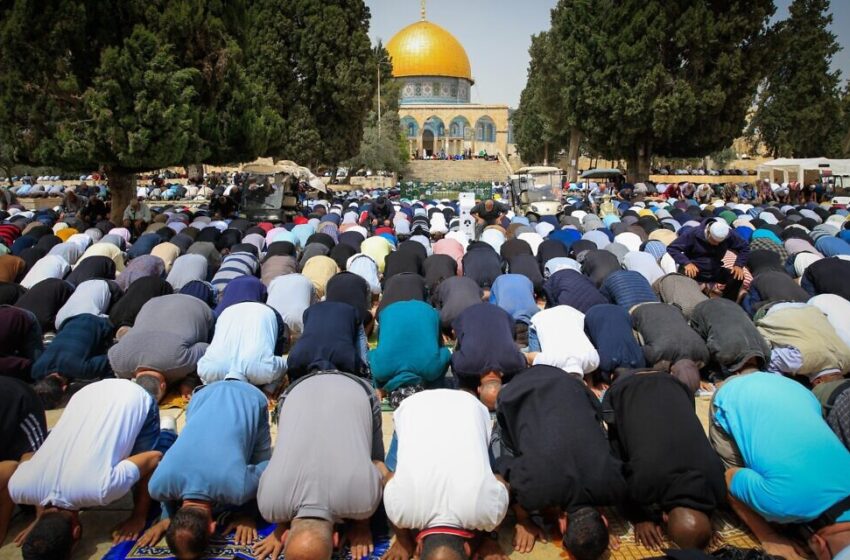
Non-Muslims to be barred from visiting the Temple Mount during the end of Ramadan
Israel Police will bar non-Muslims from visiting the Temple Mount and the Al-Aqsa Mosque compound from Friday until the end of the Muslim holy month of Ramadan on May 2.
The plan was leaked to a number of Hebrew media outlets on Tuesday evening, sparking immediate outcry from right-wing lawmakers and pundits, who blasted the government for “caving to terror” following days of clashes between Palestinians and Israeli police on the Temple Mount.
The policy of barring non-Muslims from visiting the Temple Mount during the last roughly ten days of Ramadan has been in place for years, however.
Last year, former prime minister Benjamin Netanyahu ordered the site closed to non-Muslims for 19 days during Ramadan. He came under heavy criticism when he barred the site from reopening to Jewish worshipers on Jerusalem Day, a nationalist holiday celebrating Israel taking control of the capital in 1967, which coincided with Ramadan.
His government said the move was evidence it was committed to maintaining calm as tensions spiked in Jerusalem, leading to an 11-day war with Gaza terrorists.
This year’s 10-day ban on non-Muslim visitors is viewed as part of the status quo on the Temple Mount, which allows Muslims to visit and pray, while Jews are only allowed to visit during limited time slots and cannot pray. The site is the most sacred place for Jews, and the Al-Aqsa Mosque, which sites atop the Temple Mount, is the third holiest site for Muslims.

Thousands of Muslim worshipers attend the first Friday prayers of the holy month of Ramadan at the Al Aqsa Mosque Compound on the Temple Mount in Jerusalem’s Old City, on April 8, 2022. (Sliman Khader/Flash90)
Neither the police nor the Prime Minister’s Office have issued a statement confirming the closure to non-Muslims.
Regional Cooperation Minister Esawi Frej, an Arab Israeli lawmaker whose office works to foster ties with nearby countries, voiced his support for the move.
“It is a decision by a government that seeks to calm tensions and not play into the hands of the provocateurs who are trying to turn the holy places into a match that ignites a fire,” he said.
Tensions between Israel and the Palestinians have spiked during Ramadan, which happens most years, as tens of thousands of worshipers, including many from the West Bank, attend prayers at the Al-Aqsa Mosque.
On Friday, those tensions boiled over after young Palestinians stockpiled rocks and other weapons inside the mosque and marched in the area, with some people carrying the green banners of the Hamas terror group.

Palestinians chant slogans and wave Hamas flags during a protest against Israel, in front of the Dome of the Rock shrine at the Aqsa Mosque compound atop the Temple Mount in Jerusalem’s Old City, April 15, 2022. (AP Photo/Mahmoud Illean)
Police came onto the compound to head off rioting, leading to clashes. Some 400 Palestinians were arrested and over 150 were injured. Police said they waited for morning prayers to end before entering the Temple Mount to disperse the rioters, some of whom threw stones at the Western Wall below.
Footage circulating online showed Palestinians piling rocks inside the mosque and hurling stones and fireworks at police. Other videos showed striking civilians with batons and entering the mosque, which sparked condemnation from Israel’s Arab neighbors. Jordan and the United Arab Emirates summoned Israel’s ambassadors to their countries for a dressing down, and the US, European Union and United Nations issued statements calling for calm.
Israel says it is committed to maintaining the status quo at the site and pointed to the arrests of Jewish extremists who were seeking to perform a Passover sacrifice at the site by slaughtering a goat, a plan that had inflamed Palestinians.

Israeli police officers during clashes outside the Al Aqsa Mosque, in Jerusalem’s Old City on April 17, 2022. (Yonatan Sindel/Flash90)
Israel has also highlighted a campaign of incitement led by Hamas and other extremist groups that falsely claim Israel is aiming to violate the status quo at the Temple Mount. Last week, Gaza terror groups called for an escalation against Israel over the holy site.
Ramadan this year coincides with the week-long Jewish Passover holiday, causing further friction, as many Jews head to their holy places, including the Western Wall. Palestinians have attacked buses and worshipers heading to the wall in the past week.
US Secretary of State Antony Blinken on Tuesday ordered Assistant Secretary of State for Near Eastern Affairs Yael Lempert and Deputy Assistant Secretary of State for Israeli and Palestinian Affairs Hady Amr to travel to Israel, the West Bank, Jordan and Egypt in the coming days for meetings aimed at reducing tensions in Jerusalem, an official familiar with the matter told The Times of Israel.
Wednesday will pose an additional challenge as Israeli far-right activists are gearing for a march through the Old City of Jerusalem that will pass through the flashpoint Damascus Gate in the city’s Arab quarter. Police initially refused to authorize the march but were reportedly continuing talks with the organizers late Tuesday night.
Israeli security forces have also been carrying out widespread arrests in the West Bank after a series of terror attacks in Israel killed 14. The arrest raids sometimes spill into violence in West Bank cities, and at least 17 Palestinians have died in the clashes.
